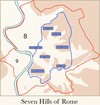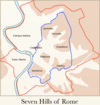Part Two Flashcards
(171 cards)
Give the dictionary entry for the Latin noun “amphitheātrum”.
amphitheātrum, amphitheātrī, n.—amphitheater; circular or oval building in which each successive seat, raised above the last, furnished an unobstructed view
What is the meaning of the Latin conjunction “sed”?
sed—but
Give the dictionary entry for the Latin adjective “decem”.
decem—ten
Give the dictionary entry for the Latin noun “charta”.
charta, chartae, f.—leaf of the Egyptian papyrus, paper; thin leaf, plate, lamina, tablet
Give the dictionary entry for the Latin noun “mēnsa”.
mēnsa, mēnsae, f.—table; table for any purpose, as a dining-table; market-stand for meat, vegetables, etc.; money-dealer’s table or counter, a sacrificial table, etc.
Give the dictionary entry for the Latin noun “trīclīnium”.
trīclīnium, trīclīniī, n.—dining room; couch running round three sides of a table for reclining on at meals, eating-couch, table-couch.
Give the dictionary entry for the Latin verb “teneō”.
teneō, tenēre, tenuī, tentum—to hold
Give the dictionary entry for the Latin noun “annus”.
annus, annī, m.—year
Give the dictionary entry for the Latin verb “maneō”.
maneō, manēre, mānsī, mānsum—to stay, wait, remain
Give the dictionary entry for the Latin verb “pugnō”.
pugnō, pugnāre, pugnāvī, pugnātum—to fight; combat, give battle, engage, contend
Give the dictionary entry for the Latin noun “ātrium”.
ātrium, ātriī, n.—core of a Roman house
Give the dictionary entry for the Latin noun “cubiculum”.
cubiculum, cubiculī, n.—bedroom; apartment for reclining or for sleeping, restingchamber or sleepingchamber, bedchamber
Give the dictionary entry for the Latin noun “lātrīna”.
lātrīna, lātrīnae, f.—bath, water-closet, privy
Give the dictionary entry for the Latin noun “peristȳlium”.
peristȳlium, peristȳliī, n.—open courtyard which contained a garden with columns surrounding it; place surrounded with columns on the inside, peristyle
Give the dictionary entry for the Latin noun “taberna”.
taberna, tabernae, f.—hut, shed, booth, stall, shop constructed of boards
Give the dictionary entry for the Latin verb “dēmōnstrō”.
dēmōnstrō, dēmōnstrāre, dēmōnstrāvī, dēmōnstrātum—to show; point out, as with the finger; indicate, designate
What is the meaning of the Latin adverb “diū”?
diū—for a long time
Give the dictionary entry for the Latin pronoun “tū”.
tū—you (singular); thou
Give the dictionary entry for the Latin noun “arma”.
arma, armōrum, n.—arms
Give the dictionary entry for the Latin adjective “clārus”.
clārus, clāra, clārum—clear, famous, bright
What is the meaning of the Latin preposition “post”?
post—after (with the accusative case)
Give the dictionary entry for the Latin verb “timeō”.
timeō, timēre, timuī, ————to fear, be afraid; be afraid of; dread, apprehend; be in fear, be fearful, apprehensive, or anxious
Give the dictionary entry for the Latin pronoun “vōs”.
vōs—you (plural)
Give the dictionary entry for the Latin noun “stilus”.
stilus, stilī, m.—stake with which to write on wax tablets



































































































